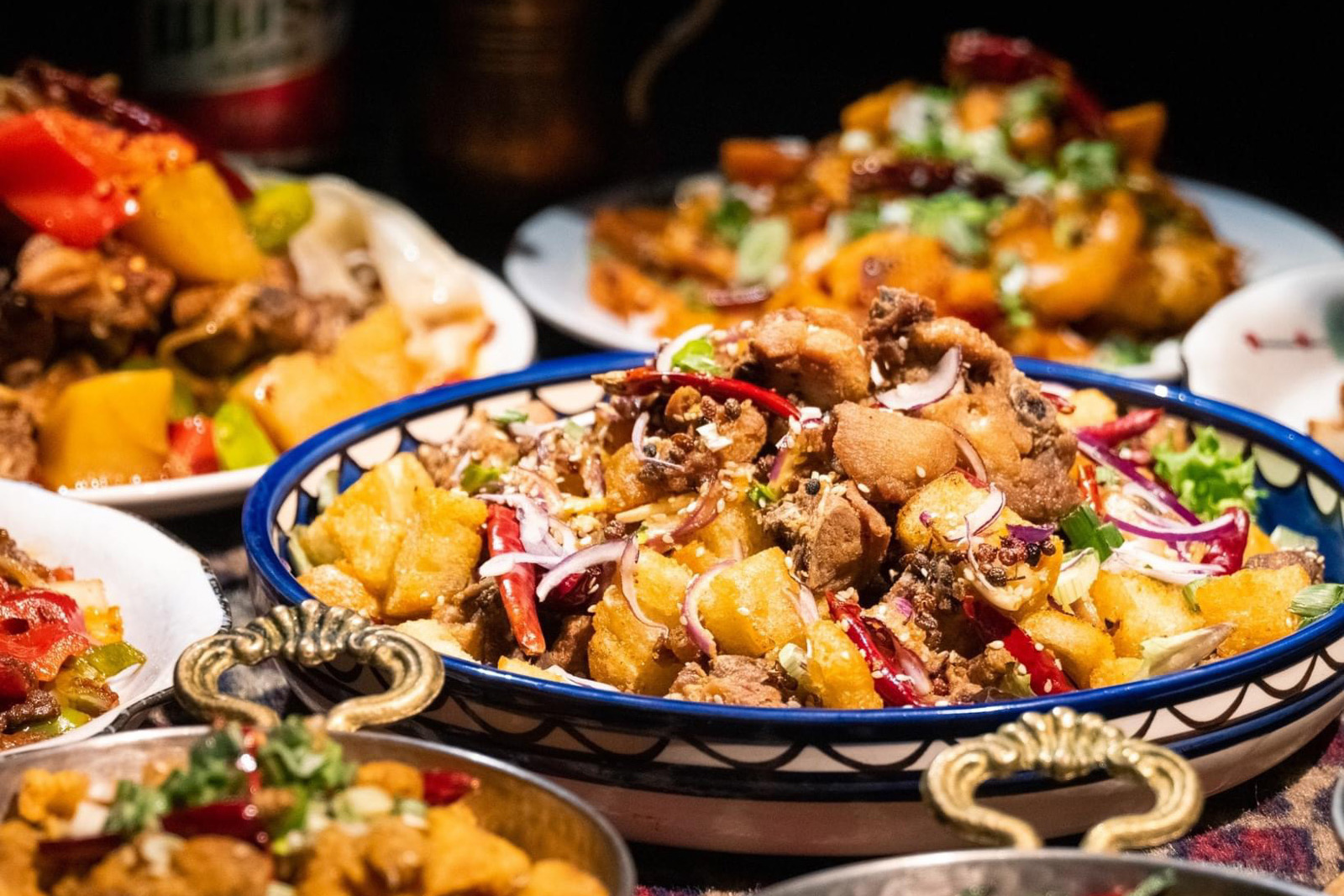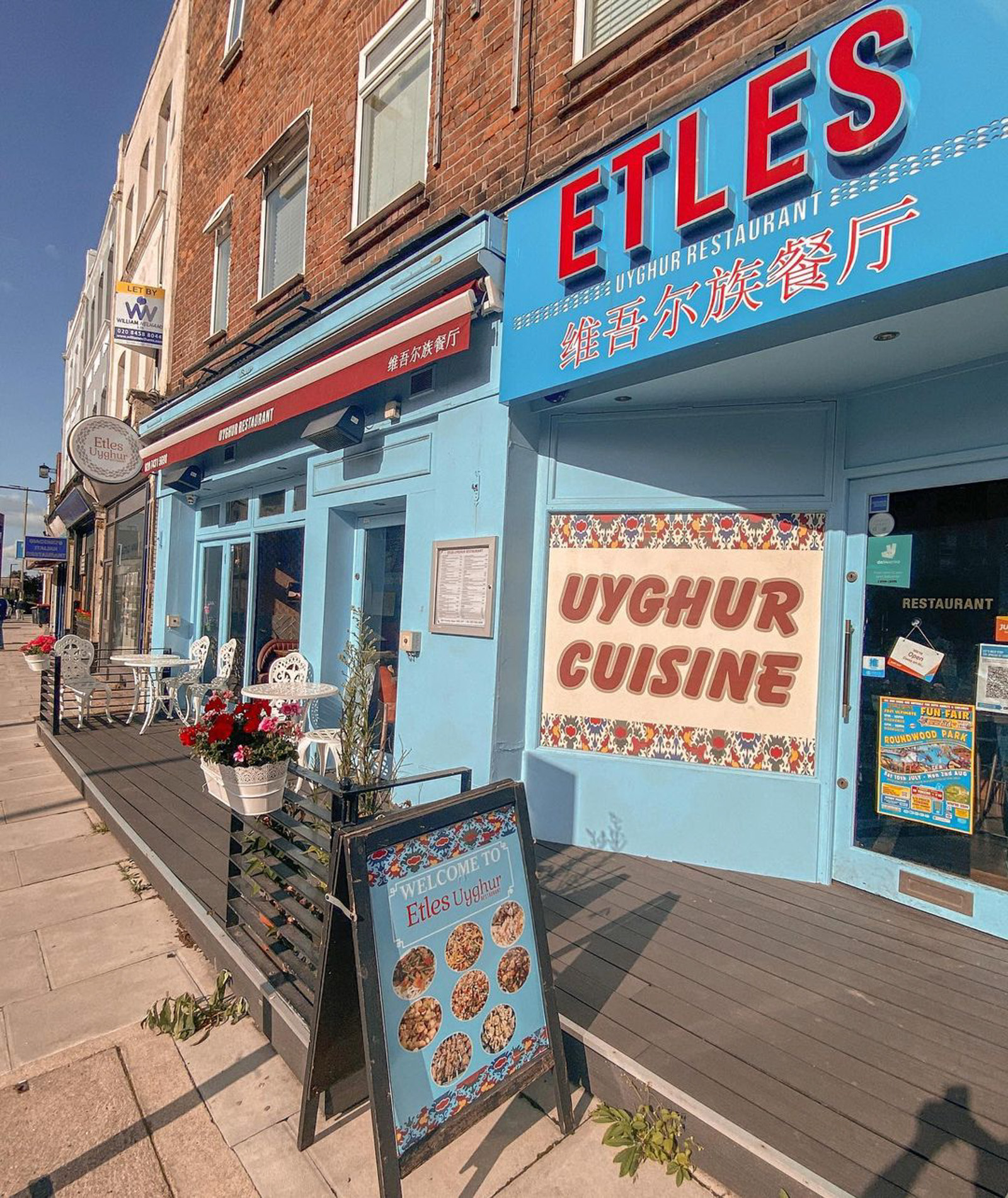A warm and fragrant journey into Uyghur cuisine
A small but growing number of restaurants are building outsized reputations by serving up a unique blend of hearty Central Asian and Chinese flavours
–

I had my first encounter with Uyghur food while visiting my sister in Istanbul in 2018. As a change from the plethora of Turkish kebabs and lahmacun we had been eating, she was keen to introduce me to a delicious and authentic variety of halal Chinese food she had discovered in the city. Back then, I had no knowledge of the culture and cuisine of the Uyghur people, a predominantly Muslim Turkic ethnic group from Central and East Asia.
Tarhan Uyghur lay in a bustling corner of Fatih, a traditional and historic district near the centre of the city. In recent years the area has become home to large immigrant communities, mainly from Syria and Iraq, and many of its restaurants reflect that demographic change. Tarhan was a welcome relief from the heat and crowds outside, its cool interior featuring tiled floors and lush plants framing the windows. Perusing the menu, I was surprised to find that it lacked many of the takeout classics I had long been familiar with. Instead of crispy shredded beef and sweet and sour chicken balls, its signature dishes were lagman (hand-pulled noodles) and samsa, a samosa-like crispy pastry filled with spiced minced lamb.
Tucking into the aptly named big-plate chicken — a colossal platter of thick noodles topped with vegetables, chicken pieces and fondant potatoes, glazed in a piquant red sauce — was both comforting and unanticipated. Unlike any Chinese food I had ever experienced, the flavours were rich, meaty and warm, blending fragrant cinnamon and cumin with the chilli and soy I had expected. After my meal, I learnt that Turkey’s Uyghur community numbers some 50,000 people and that restaurants specialising in its cuisine have claimed a place among Istanbul’s finest culinary experiences. In recent years, a smaller Uyghur community has established itself in the UK, many of its members having fled government persecution in the autonomous region of Xinjiang, north-west China. While Xinjiang Uyghurs share close cultural ties with neighbouring nations such as Kazakhstan, Kyrgyzstan and Tajikistan, their cuisine is a unique blend of central Asian and Chinese influences.
While Uyghur food cannot be found on every UK high street, the modest number of restaurants that do exist have built outsized reputations for themselves. Etles is a small establishment at the end of a busy main road in Walthamstow, east London. Inside, traditional tapestries and musical instruments hang on the walls and the scent of cumin-dusted grilled meat wafts through the air.

Recently named as one of Time Out‘s top-five places to eat in the capital, its standout dish is the lamb lagman at £14. A healthy portion of robustly spiced stir-fried meat nestles among plump and chewy noodles, freshly pulled in house. The soy and garlic sauce is delectable and a scattering of sesame seeds lends an earthy pop. Manta (£9.99) — lamb dumplings, similar to Turkish manti and Afghan mantu, but with a shell closer to dim sum — also speak to the geography and history of the region. It’s a bold and homely menu, fragrant and rich in umami.
One of the first Uyghur restaurants in the UK opened in 2012 — in Leicester, not London. The original Karamay, which started serving traditional Uyghur food alongside better-known dishes such as Kung Pao chicken and salt and pepper prawns, is still serving happy customers in the city, but husband-and-wife team Fahad and Taj Karamay have now expanded into London. Karamay’s flagship Tower Bridge branch launched in August 2023, relocating from Hackney where it had operated since 2018. A casual dining spot focusing on hand-pulled noodles opened in Oxford Circus at the beginning of 2023 and a further outlet is planned for Bayswater later in 2024.
“In recent years Uyghur food has become more known to people and the increasing number of restaurants reflects that,” says Fahad, explaining the appeal of the dishes by adding that “we are at the crossroads between central Asia and China”.
Service at Karamay Oxford Circus is brisk and the surroundings are sleek and modern, with metro tiles and noodle-based pop art adorning the walls. While big-plate dishes are scaled down to individual portions — chicken at £14.90 — other staples such as the chilli-encrusted lamb skewers (£4 each) and manta (£12) are reassuringly authentic.
Finally, Dilara sits at the Finsbury Park end of Blackstock Road, north London, serving a mix of Turkish dishes and Uyghur classics. A deceptively large space with warm and friendly service, its lagman (£13.95) is one of the most enjoyable you’ll find: a bed of toothsome house-made noodles topped with a generous amount of lamb, al-dente peppers and a tangy, slightly numbing sauce that you’ll want to drink from the bowl.
A selection of big-plate dishes featuring thick belt noodles ranges from tomato and egg to chicken, lamb, beef and oxtail. While some are on the pricey side at up to £59.95, they will comfortably feed a group of four, especially if you add a side dish or two. One of the best is the samsa, its flaky shell stuffed with gently spiced minced lamb and melting onions, at £3.50 each. Team one with a pot of sweet Uyghur milk tea and you’ll think twice about ordering your old Cantonese favourites ever again.
Topics
Get the Hyphen weekly
Subscribe to Hyphen’s weekly round-up for insightful reportage, commentary and the latest arts and lifestyle coverage, from across the UK and Europe
